Jua Restaurant
36 E 22nd St, New York, NY 10010
646-590-1598
www.juanyc.com
Thu 11/30/2023, 08:20p-10:40p
![Jua Exterior]()
If you've read my last couple posts, you'll know that I was recently in DC for business. After my work was done, I decided to take a side trip up to NYC to eat, since the city's only about an hour flight away. One of the spots that I was curious to try was Jua, a modern Korean restaurant with a wood-fired focus that opened back at the start of 2020. The place is the creation of Chef Hoyoung Kim, in partnership with HAND Hospitality, a company founded in 2011 that's probably best known for being one of the driving forces behind Atomix. A note on the name: when I first heard about Jua, I thought that it took its moniker from an odd romanization of joh-a (좋아), the Korean word for "good." However, it's actually joo-ah (주아), named in honor of the Chef's daughter Jua, who was in turn named after the French word "joie."
About the Chef: A native of South Korea, Kim Ho-young (김호영) was born in February 1986, and got interested in cooking early on, helping his mother prepare meals. His initial education in the craft comprised both a culinary arts-focused high school and college-level studies in cooking and restaurant management. Following completion of his mandatory military service, Kim was able to secure a line cook gig at Jungsik Yim's game-changing Jung Sik Dang (정식당) in Seoul in 2009. When Yim opened his second outpost of Jungsik in Manhattan in 2011, he brought him over to help run the place. However, after only a couple years, Kim was allowed to go to France to broaden his skillset at École Grégoire-Ferrandi, which was followed by time spent under Pascal Barbot at L'Astrance. Meanwhile, in December 2015, his wife Mihee Baek gave birth to Jua (son Siwoo arrived two years later).
Kim finished up at Astrance at the start of February 2016, and when he returned to the US a month later, he was made Executive Chef at Jungsik. In March 2018, he held a pop-up dinner at 29B Teahouse, which was followed by another in June at Atomix, and another in September at Hortus NYC. These dinners foreshadowed the Chef's departure from Jungsik in March 2019, which coincided with another pop-up (this one hwe-focused) at O:N. By July 2019, the buildout of Jua was already in progress, and the restaurant ended up debuting in late January 2020. In hindsight, that was a rather unfortunate time to commence operations, but the team was able to pivot to delivery/takeout/outdoor dining, and by May 2021, the place had secured a Michelin star, which has been retained. The success of Jua has since allowed Chef Kim to launch Moono, a more casual, more traditional Korean spot that opened at the end of March this year.
![Jua Interior]()
![Jua Dining Room]()
![Jua Kitchen]()
Jua resides in a narrow building in the Flatiron District, one that features the bar up front, the dining room in the middle, and the kitchen in the back, with the design coming courtesy of local firm Two Point Zero. It's a fairly rustic-industrial space, and was reportedly meant to evoke the image of a mountain cabin.
![Jua Menu]()
![Jua Cocktail, Beer, Spirits & Tea List]()
![Jua Wines by the Glass List]()
Here we see Jua's menu (signed by CdC Hyuna Lee, who comes from the Jungsik in Seoul), priced at a reasonable $135, with the optional wine pairing tacking on another $95. Also pictured is the restaurant's selection of cocktails, beers, sul, tea, and wines by the glass, all overseen by GM/Beverage Director Jaehoon No. The wine list--which veers French and young--can be viewed here. Corkage is $50 a bottle, limit two. Click for larger versions.
![Caviar Kim]()
1: Caviar Kim
My meal began with a healthily-sized dollop of golden Ossetra caviar, set atop bluefin tartare, avocado, kimchi, and truffle rice, all encased in a wonderfully crispy seaweed wrapper. There was just such a gratifying interplay of flavors here: a nutty-toastiness up front, leading to the freshness of avocado and tuna, then to the saltiness of the caviar, then to the grassiness of the laver, and finally to the heat of kimchi and the gim's persistent savoriness. An unabashedly lux version of the bunsik staple that is gimbap, this was a fantastic start, one that really set the stage for the rest of the night.
![Seoul Breeze]()
Seoul Breeze [$20.00] | Pine Soju, Crème de Menthe, Sakura Vermouth
I opted for cocktails this evening, and this was neatest of the bunch. I found citrus and florals up front, but these notes were quickly overtaken by a potent, yet elegant pine-laced mintiness that lingered surprisingly long.
![Uni Kim]()
Supplement: Uni Kim [$32.00]
A second, perhaps even more decadent one-biter kimbap variation married wonderfully sweet, briny Maine sea urchin with the nuttiness of rice and what I believe was soy-braised burdock, all offset, once again, by that perfectly delicate, shattery seaweed, which just might be the best I've had. Although this might look like a your typical gunkan-maki, it was, in fact, much, much better.
![Scallop]()
2: Scallop
In this rather monochromatic course, Cape Cod scallop was served with burdock, bellflower roots, apple pear, and finger lime, then set in a smoked tofu-pine nut purée and capped with Japanese radishes. I loved how the sweet salinity of the scallops meshed with the creamy, nutty, and smoky character of the purée, while the pear and pricks of sourness from the citrus perked things up beautifully. A super clever mélange of flavors that I'd never tasted together before.
![Pink Me!]()
Pink Me! [$18.00] | Haku Vodka, Cointreau, Bokbunja, Honey, Egg White
I chose my second cocktail because I was curious as to how it'd incorporate the bokbunja ju. I found the drink honeyed and floral at first blush, supported by the sweet-tartness of the raspberries, all while that eggy foam softened the flavors at play.
![Jook + Abalone]()
3: Jook + Abalone [+$20.00]
Next came what must be the best jeonbok-juk I've ever had, one bolstered by smoked eel, foie gras emulsion, king trumpet mushrooms, spinach, kimchi, sesame seeds, and chives. The abalone was fantastic texturally, with a rustic-yet-refined presentation of gamchilmat that I reveled in. However, the actual porridge was even more impressive thanks to how harmoniously all the components coalesced. I was especially fond of the bitterness imparted by the spinach, the flashes of nutty sesame, hints of citrus, as well as the dish's peppery undertone. A super comforting, yet exciting rendition of a Korean staple.
![Sam-Chi]()
4: Sam-Chi
A near-perfectly rectangular filet of Cape Cod Spanish mackerel was brined and charred, giving the fish a wonderful smoke and sophisticated brine, along with a pleasingly rare consistency. The brightness of a mustard-dressed green apple-chayote salad provided some crucial contrast, while a savory, zippy plum-soy dashi broth brought it all together.
![Smoked & Spice]()
Smoked & Spice [$20.00] | Mezcal, Tequila, Amaro Nonino, Chili
My third cocktail was much more restrained than I was expecting, given its description. Think light, fruity, citrusy nuances up front, leading to a creeping heat and smoke, accented by the herbal bittersweetness of the amaro.
![Banchan]()
![Duck & Chan]()
5: Duck & Chan
Two-week dry-aged duck was excellent, its delectably deep, almost funky flavors perked up by a wonderfully crisp, salty skin. The ori was of course delicious alone, but was also accompanied by a selection of "banchan." Clock-wise from the bottom:![Sujeonggwa]()
6: Sujeonggwa
My first dessert was a thoroughly reimagined version of a traditional Korean cinnamon punch. I got all the sweet-n-spicy flavors I was looking for, but juxtaposed seamlessly with the juicy sweetness of both pear sorbet and diced pear.
![Organic Sejak]()
Along with dessert, I enjoyed some Organic Sejak [$16]. The green tea was super grassy up front, with a bit of roast, while a fruitiness crept in later.
![Brown Butter Ice Cream]()
![Goguma Juak]()
7: Goguma Juak
A sweet potato-enriched, glazed rice flour fritter had a delightful chew, along with an appropriately autumnal sweetness. The "doughnut" matched flawlessly with that brown butter ice cream, which boasted a polished sort of richness and a nearly semifreddo-like texture, along with some crispy bits thrown in for good measure.
The kitchen delivered a pretty stellar dinner tonight, with really no misses, and provided further evidence that New York City is undoubtedly the epicenter of contemporary Korean cuisine (outside of Korea proper). The cooking had that creativity and modernity I was looking for, but was still familiar, still approachable, while the food also set itself apart through the thoughtful use of that wood-fired grill. Jua is still a relative newcomer, but I envision big things for Kim and his team in the years to come.
36 E 22nd St, New York, NY 10010
646-590-1598
www.juanyc.com
Thu 11/30/2023, 08:20p-10:40p

If you've read my last couple posts, you'll know that I was recently in DC for business. After my work was done, I decided to take a side trip up to NYC to eat, since the city's only about an hour flight away. One of the spots that I was curious to try was Jua, a modern Korean restaurant with a wood-fired focus that opened back at the start of 2020. The place is the creation of Chef Hoyoung Kim, in partnership with HAND Hospitality, a company founded in 2011 that's probably best known for being one of the driving forces behind Atomix. A note on the name: when I first heard about Jua, I thought that it took its moniker from an odd romanization of joh-a (좋아), the Korean word for "good." However, it's actually joo-ah (주아), named in honor of the Chef's daughter Jua, who was in turn named after the French word "joie."
About the Chef: A native of South Korea, Kim Ho-young (김호영) was born in February 1986, and got interested in cooking early on, helping his mother prepare meals. His initial education in the craft comprised both a culinary arts-focused high school and college-level studies in cooking and restaurant management. Following completion of his mandatory military service, Kim was able to secure a line cook gig at Jungsik Yim's game-changing Jung Sik Dang (정식당) in Seoul in 2009. When Yim opened his second outpost of Jungsik in Manhattan in 2011, he brought him over to help run the place. However, after only a couple years, Kim was allowed to go to France to broaden his skillset at École Grégoire-Ferrandi, which was followed by time spent under Pascal Barbot at L'Astrance. Meanwhile, in December 2015, his wife Mihee Baek gave birth to Jua (son Siwoo arrived two years later).
Kim finished up at Astrance at the start of February 2016, and when he returned to the US a month later, he was made Executive Chef at Jungsik. In March 2018, he held a pop-up dinner at 29B Teahouse, which was followed by another in June at Atomix, and another in September at Hortus NYC. These dinners foreshadowed the Chef's departure from Jungsik in March 2019, which coincided with another pop-up (this one hwe-focused) at O:N. By July 2019, the buildout of Jua was already in progress, and the restaurant ended up debuting in late January 2020. In hindsight, that was a rather unfortunate time to commence operations, but the team was able to pivot to delivery/takeout/outdoor dining, and by May 2021, the place had secured a Michelin star, which has been retained. The success of Jua has since allowed Chef Kim to launch Moono, a more casual, more traditional Korean spot that opened at the end of March this year.
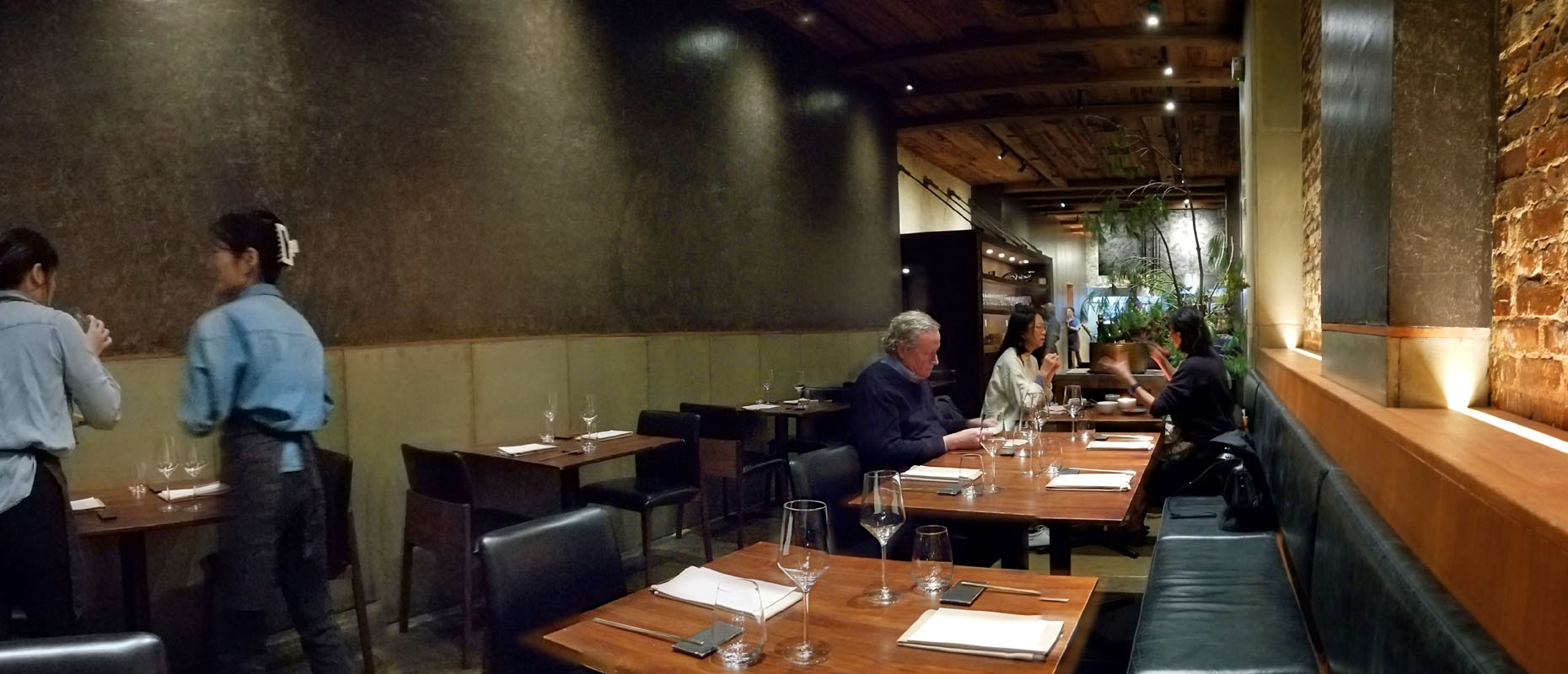
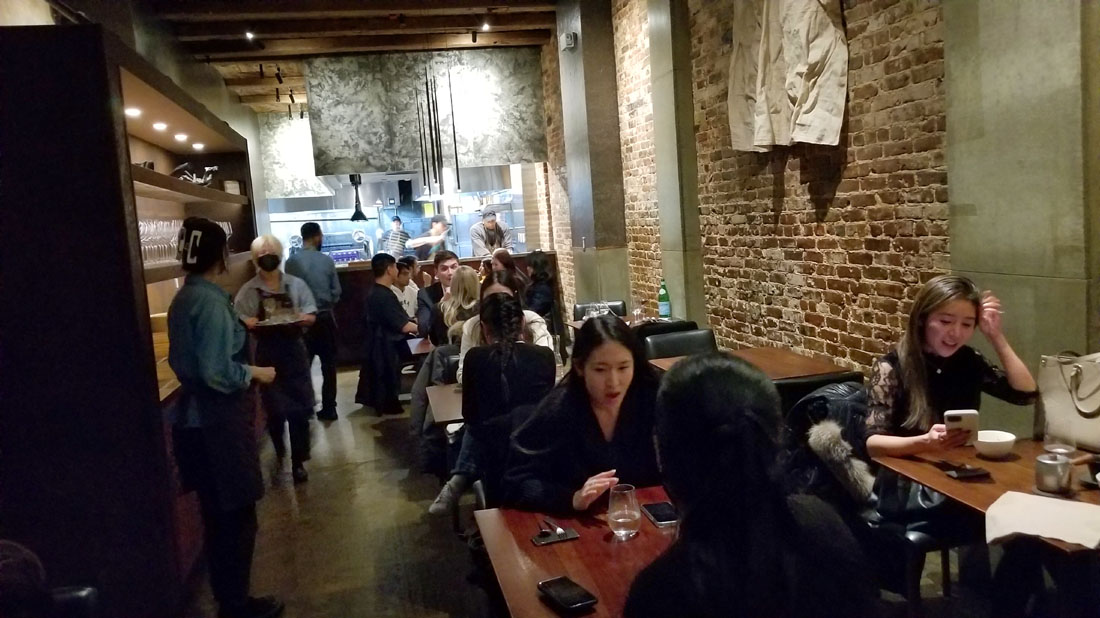
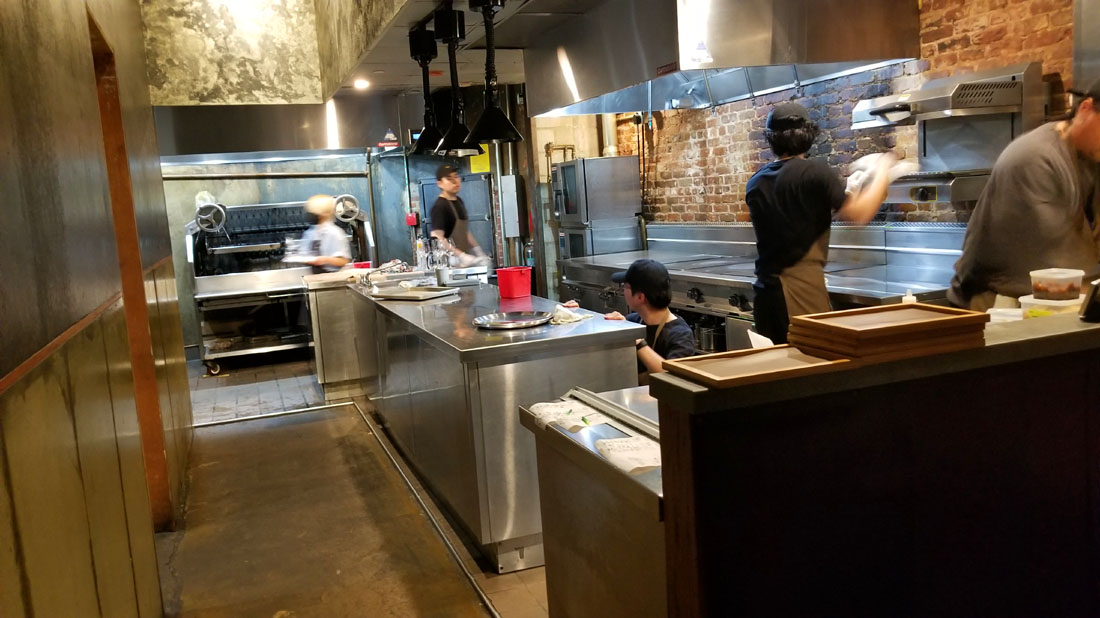
Jua resides in a narrow building in the Flatiron District, one that features the bar up front, the dining room in the middle, and the kitchen in the back, with the design coming courtesy of local firm Two Point Zero. It's a fairly rustic-industrial space, and was reportedly meant to evoke the image of a mountain cabin.
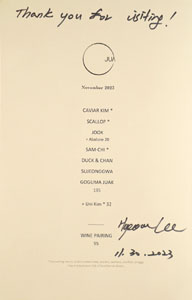
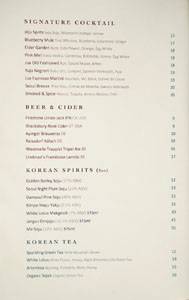
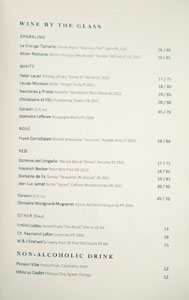
Here we see Jua's menu (signed by CdC Hyuna Lee, who comes from the Jungsik in Seoul), priced at a reasonable $135, with the optional wine pairing tacking on another $95. Also pictured is the restaurant's selection of cocktails, beers, sul, tea, and wines by the glass, all overseen by GM/Beverage Director Jaehoon No. The wine list--which veers French and young--can be viewed here. Corkage is $50 a bottle, limit two. Click for larger versions.
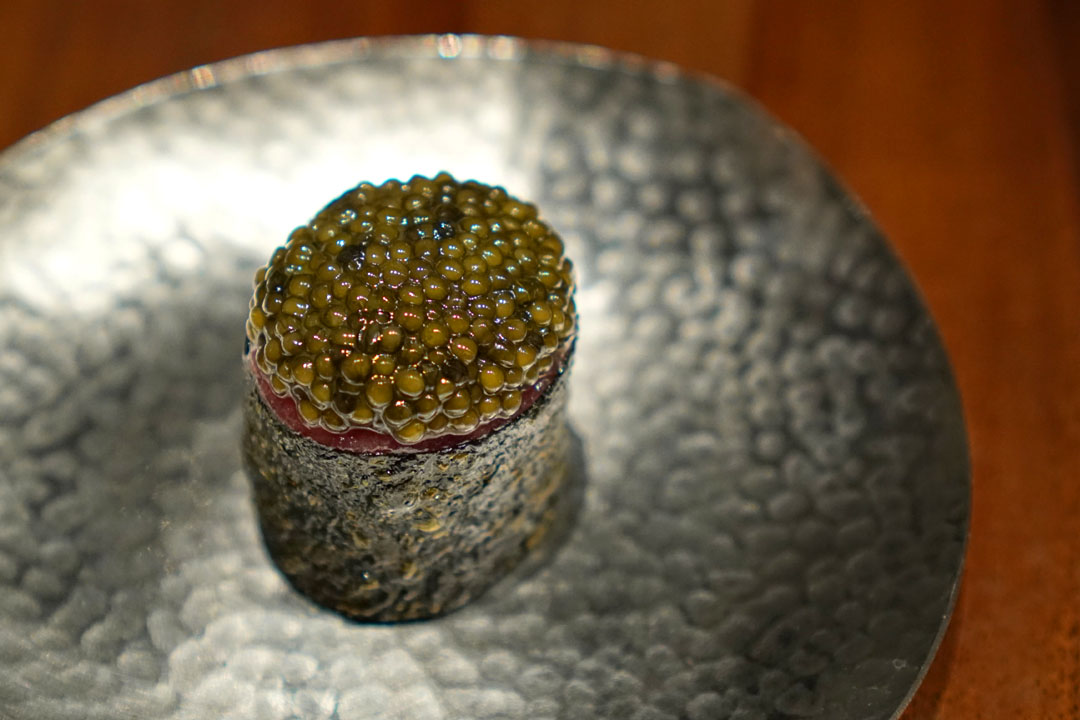
1: Caviar Kim
My meal began with a healthily-sized dollop of golden Ossetra caviar, set atop bluefin tartare, avocado, kimchi, and truffle rice, all encased in a wonderfully crispy seaweed wrapper. There was just such a gratifying interplay of flavors here: a nutty-toastiness up front, leading to the freshness of avocado and tuna, then to the saltiness of the caviar, then to the grassiness of the laver, and finally to the heat of kimchi and the gim's persistent savoriness. An unabashedly lux version of the bunsik staple that is gimbap, this was a fantastic start, one that really set the stage for the rest of the night.
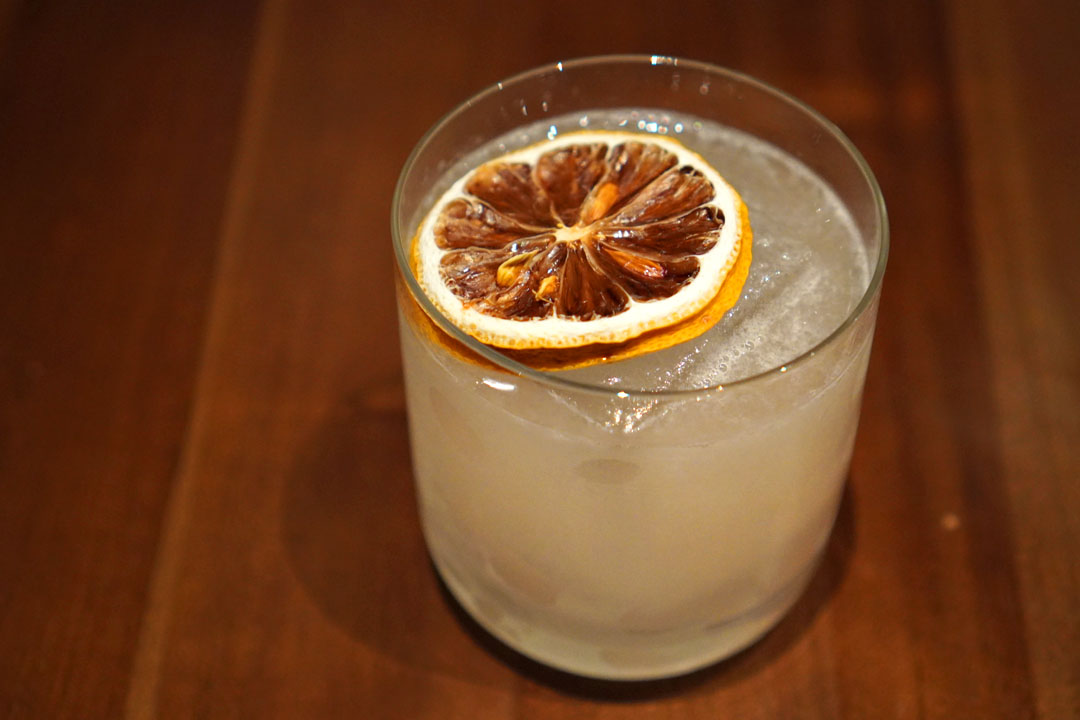
Seoul Breeze [$20.00] | Pine Soju, Crème de Menthe, Sakura Vermouth
I opted for cocktails this evening, and this was neatest of the bunch. I found citrus and florals up front, but these notes were quickly overtaken by a potent, yet elegant pine-laced mintiness that lingered surprisingly long.
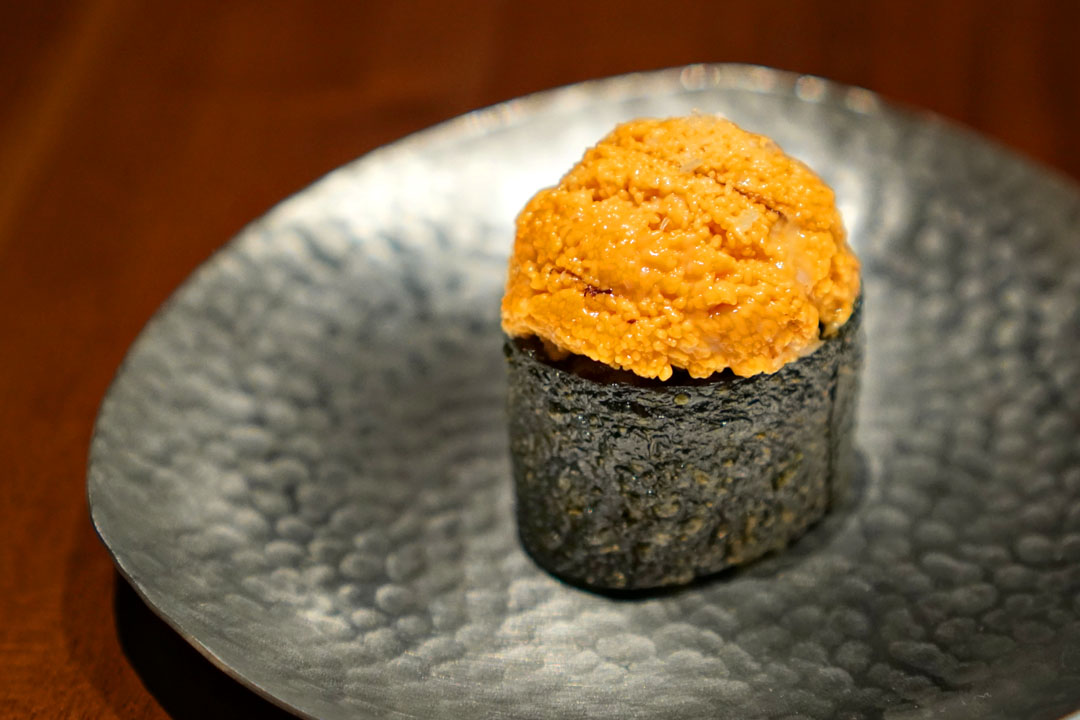
Supplement: Uni Kim [$32.00]
A second, perhaps even more decadent one-biter kimbap variation married wonderfully sweet, briny Maine sea urchin with the nuttiness of rice and what I believe was soy-braised burdock, all offset, once again, by that perfectly delicate, shattery seaweed, which just might be the best I've had. Although this might look like a your typical gunkan-maki, it was, in fact, much, much better.
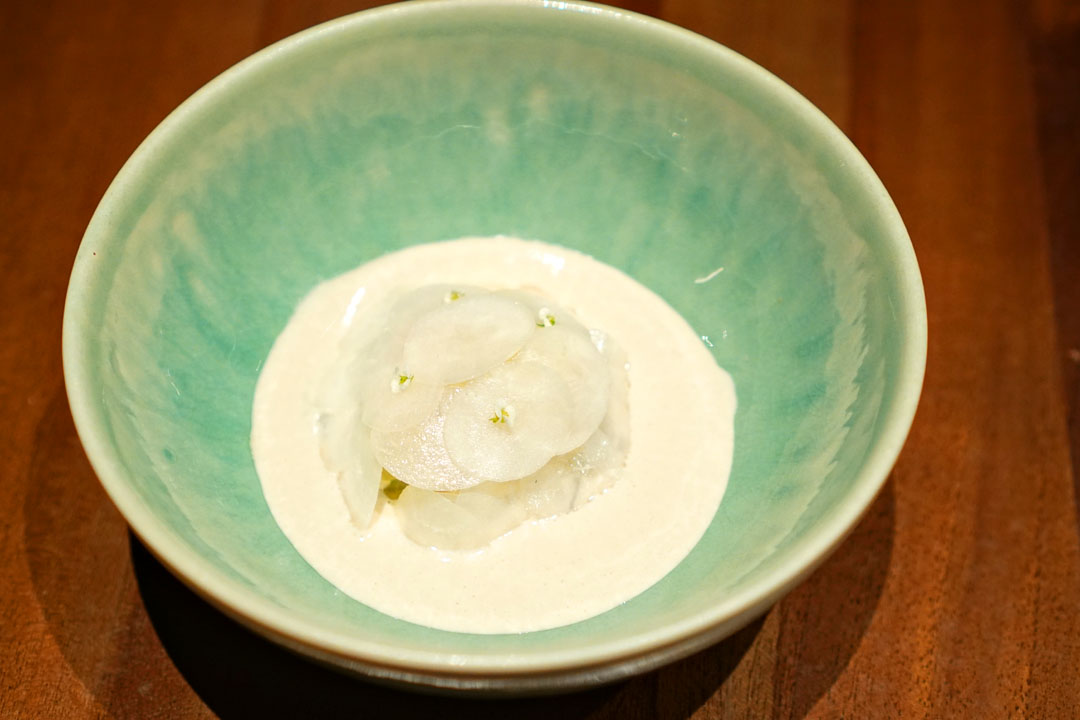
2: Scallop
In this rather monochromatic course, Cape Cod scallop was served with burdock, bellflower roots, apple pear, and finger lime, then set in a smoked tofu-pine nut purée and capped with Japanese radishes. I loved how the sweet salinity of the scallops meshed with the creamy, nutty, and smoky character of the purée, while the pear and pricks of sourness from the citrus perked things up beautifully. A super clever mélange of flavors that I'd never tasted together before.
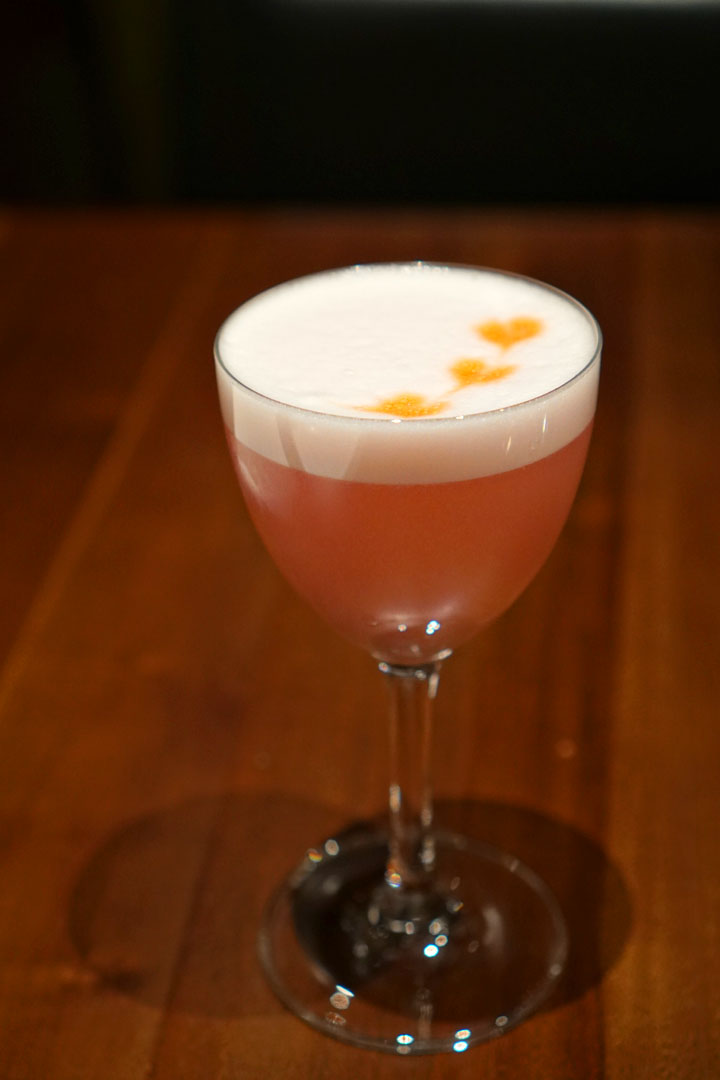
Pink Me! [$18.00] | Haku Vodka, Cointreau, Bokbunja, Honey, Egg White
I chose my second cocktail because I was curious as to how it'd incorporate the bokbunja ju. I found the drink honeyed and floral at first blush, supported by the sweet-tartness of the raspberries, all while that eggy foam softened the flavors at play.
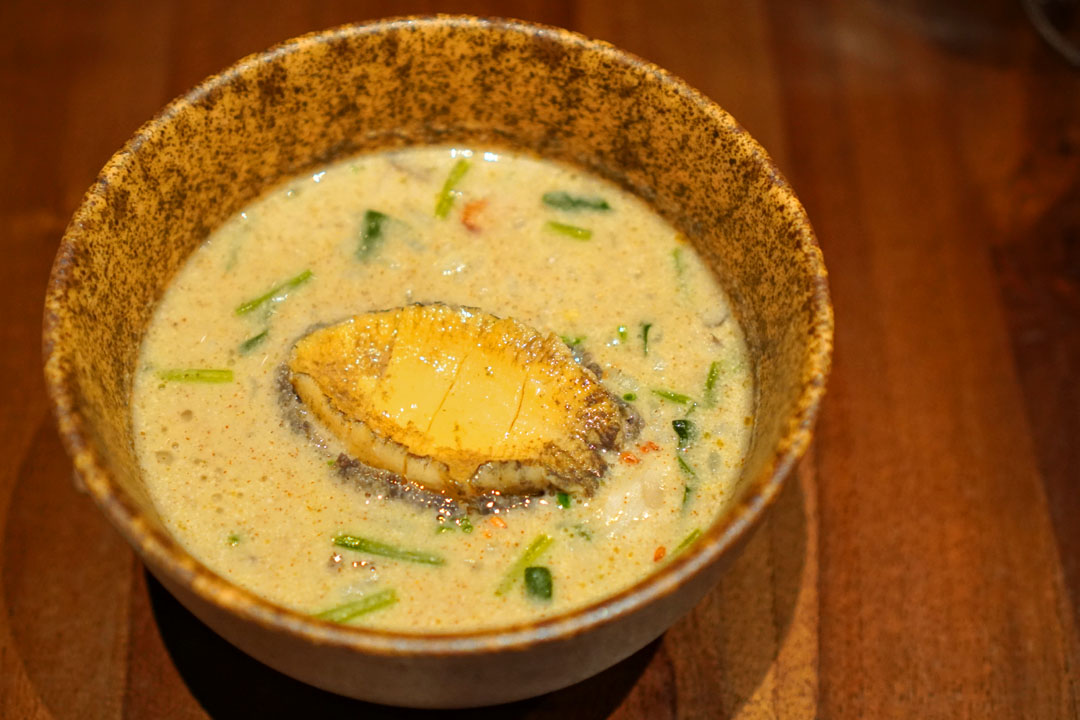
3: Jook + Abalone [+$20.00]
Next came what must be the best jeonbok-juk I've ever had, one bolstered by smoked eel, foie gras emulsion, king trumpet mushrooms, spinach, kimchi, sesame seeds, and chives. The abalone was fantastic texturally, with a rustic-yet-refined presentation of gamchilmat that I reveled in. However, the actual porridge was even more impressive thanks to how harmoniously all the components coalesced. I was especially fond of the bitterness imparted by the spinach, the flashes of nutty sesame, hints of citrus, as well as the dish's peppery undertone. A super comforting, yet exciting rendition of a Korean staple.
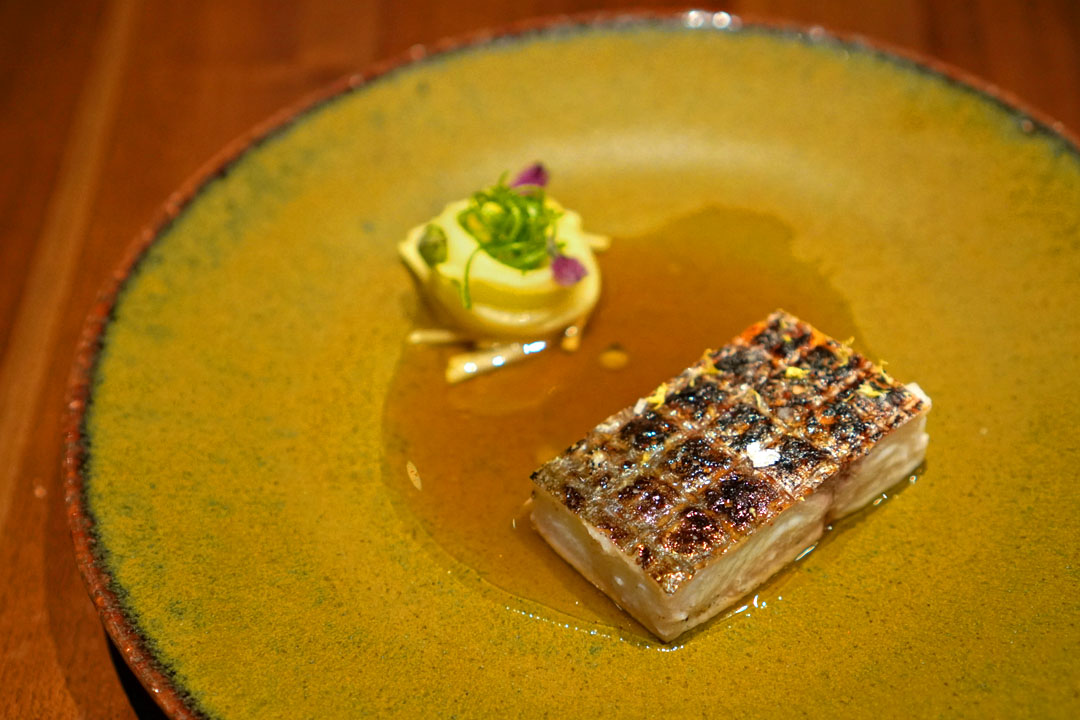
4: Sam-Chi
A near-perfectly rectangular filet of Cape Cod Spanish mackerel was brined and charred, giving the fish a wonderful smoke and sophisticated brine, along with a pleasingly rare consistency. The brightness of a mustard-dressed green apple-chayote salad provided some crucial contrast, while a savory, zippy plum-soy dashi broth brought it all together.
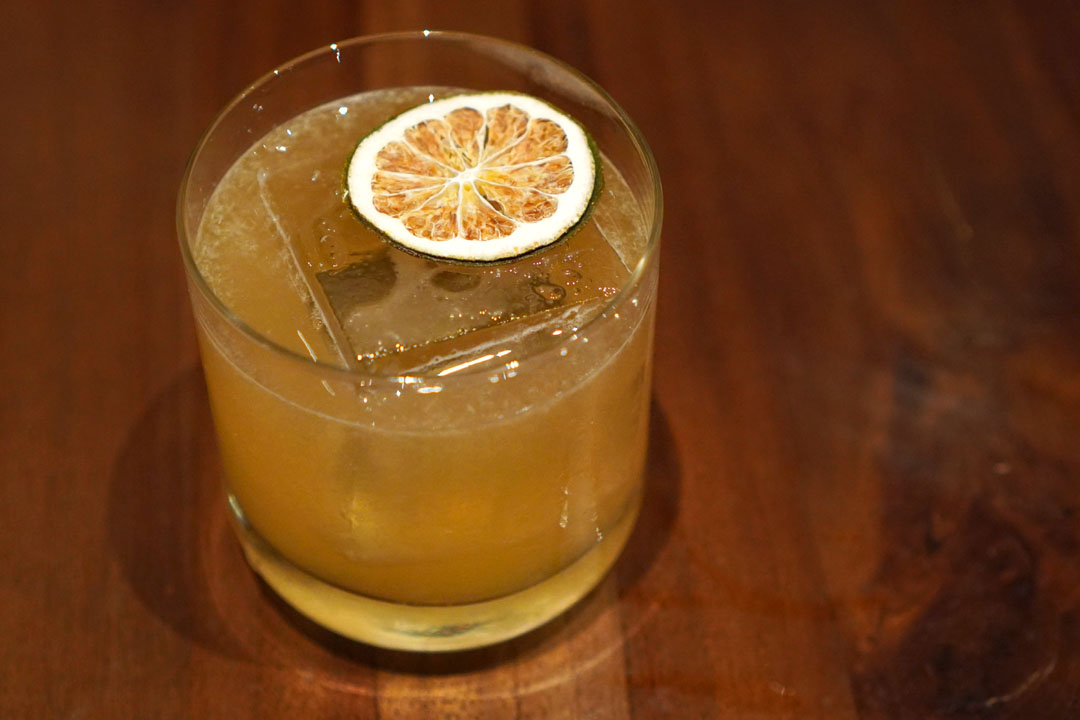
Smoked & Spice [$20.00] | Mezcal, Tequila, Amaro Nonino, Chili
My third cocktail was much more restrained than I was expecting, given its description. Think light, fruity, citrusy nuances up front, leading to a creeping heat and smoke, accented by the herbal bittersweetness of the amaro.
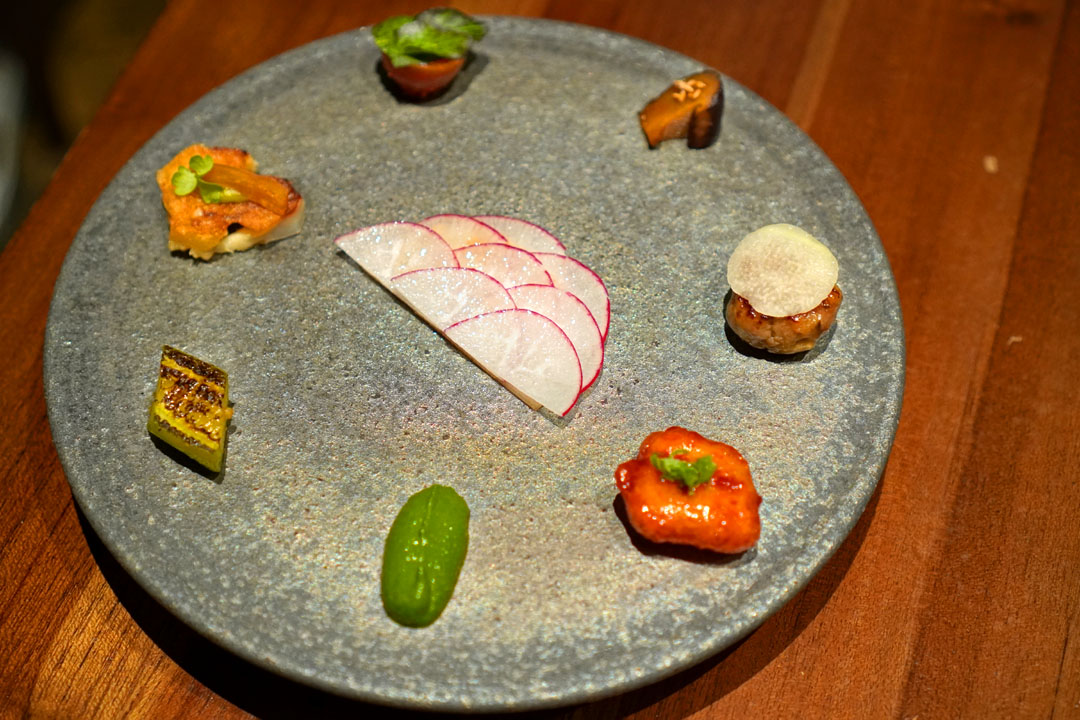
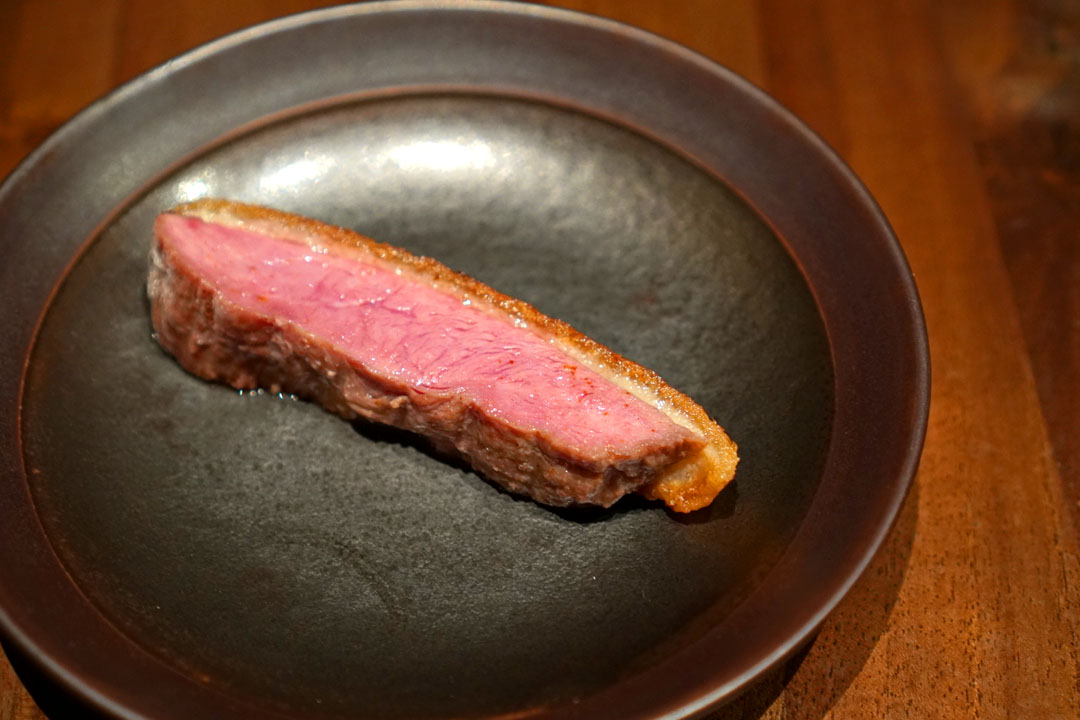
5: Duck & Chan
Two-week dry-aged duck was excellent, its delectably deep, almost funky flavors perked up by a wonderfully crisp, salty skin. The ori was of course delicious alone, but was also accompanied by a selection of "banchan." Clock-wise from the bottom:
- The chimichurri was the only accompaniment that I was specifically directed to have with the duck, and its zestiness certainly paired well with the bird.
- Charred cucumber was light and bright, but with a smidge of smoke.
- A small portion of jeon showed off the vegetal crunch of cauliflower, and was tarted up by micro-celery and a sliver of pickled onion.
- Cherry tomato was joined by gochujang and watercress, making for a tart, zingy, minty bite.
- Soy-pickled shiitake ate supple and juicy, with a sweet-savoriness that was well-matched by the nuttiness of sesame seeds.
- A wrapper-less, familiar-tasting duck dumpling was crowned with pickled chayote.
- Crisp-fried lotus root had a sweet-and-sour sort of flavor profile, and was topped with scallion.
- Thin slices of mild pickled radish were layered atop a floppy buckwheat base.
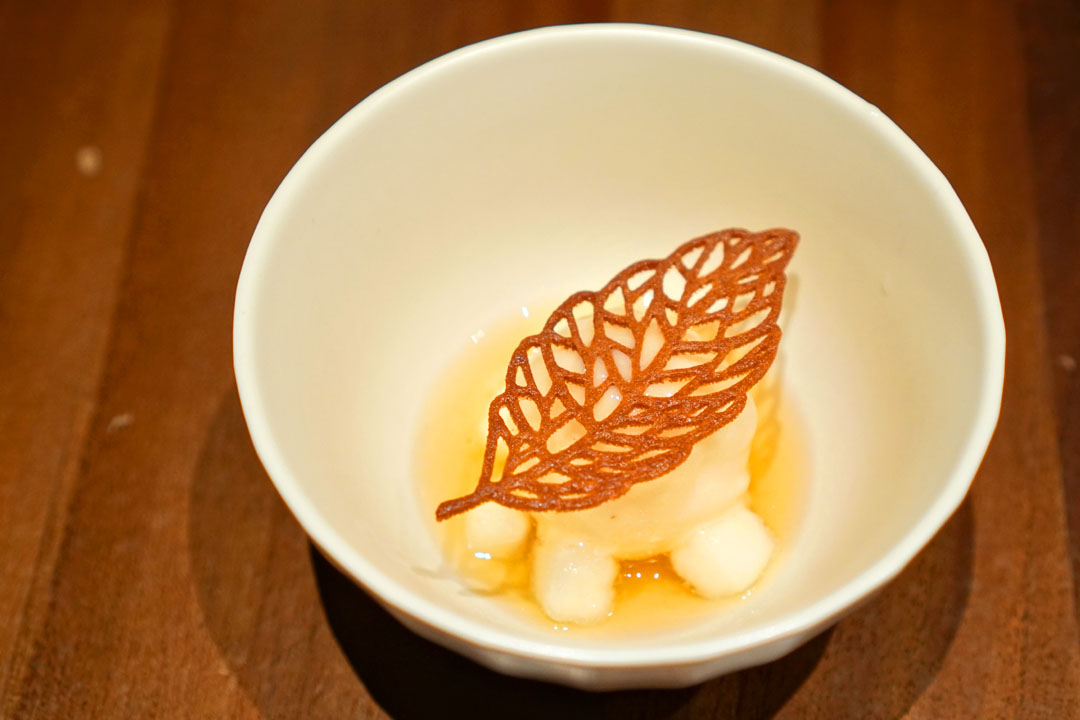
6: Sujeonggwa
My first dessert was a thoroughly reimagined version of a traditional Korean cinnamon punch. I got all the sweet-n-spicy flavors I was looking for, but juxtaposed seamlessly with the juicy sweetness of both pear sorbet and diced pear.
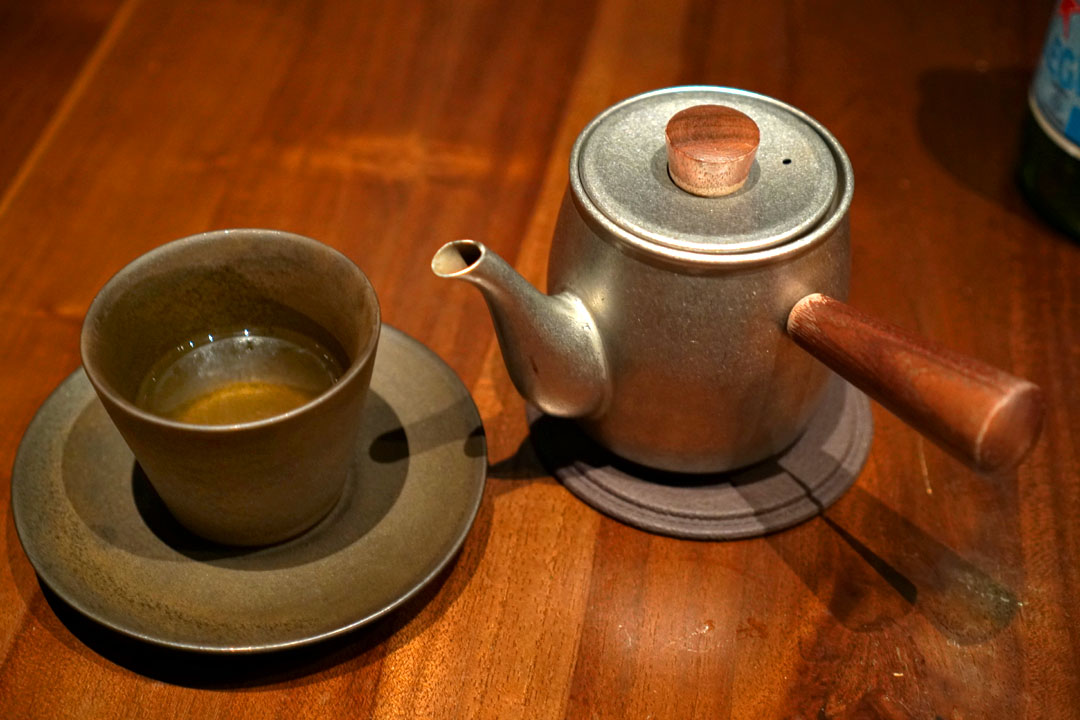
Along with dessert, I enjoyed some Organic Sejak [$16]. The green tea was super grassy up front, with a bit of roast, while a fruitiness crept in later.
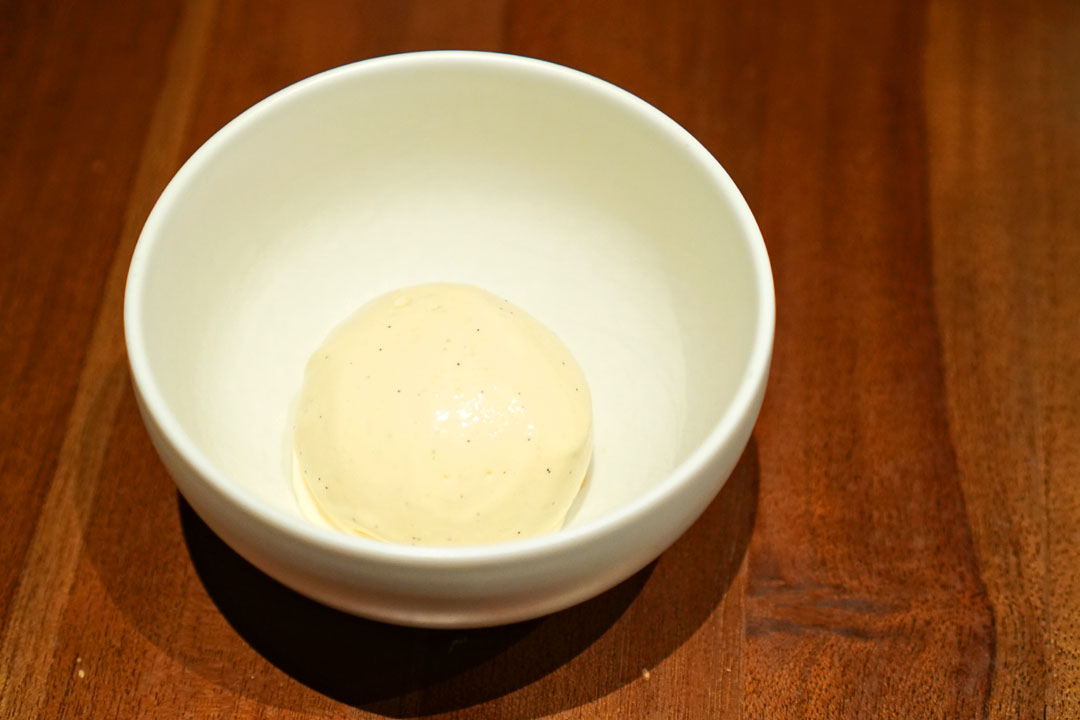
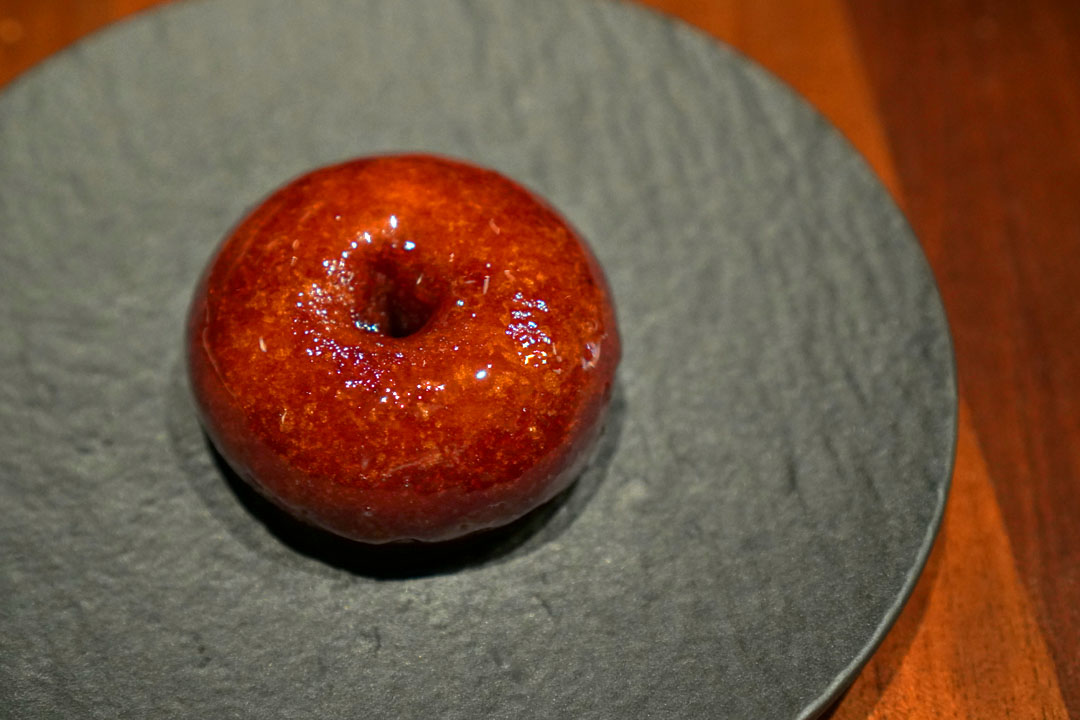
7: Goguma Juak
A sweet potato-enriched, glazed rice flour fritter had a delightful chew, along with an appropriately autumnal sweetness. The "doughnut" matched flawlessly with that brown butter ice cream, which boasted a polished sort of richness and a nearly semifreddo-like texture, along with some crispy bits thrown in for good measure.
The kitchen delivered a pretty stellar dinner tonight, with really no misses, and provided further evidence that New York City is undoubtedly the epicenter of contemporary Korean cuisine (outside of Korea proper). The cooking had that creativity and modernity I was looking for, but was still familiar, still approachable, while the food also set itself apart through the thoughtful use of that wood-fired grill. Jua is still a relative newcomer, but I envision big things for Kim and his team in the years to come.